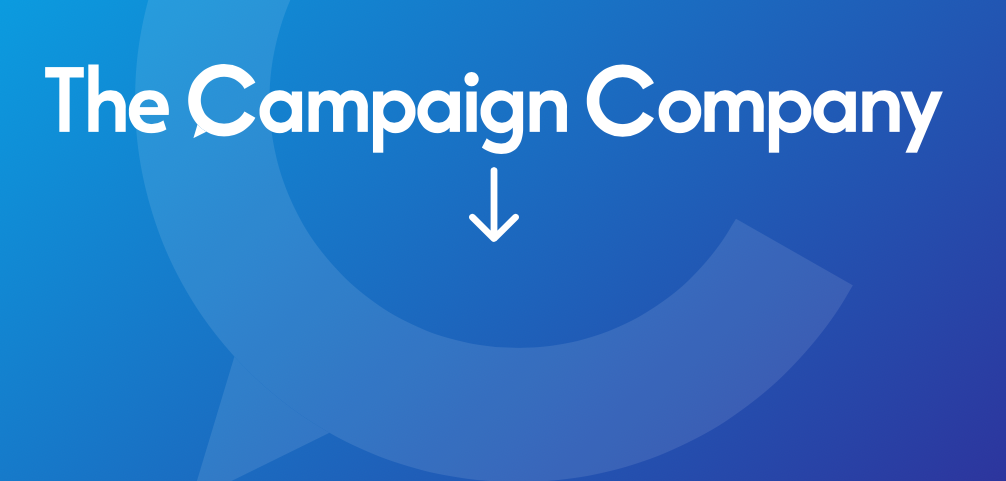Jordan Williams is the co-Founder, Executive Director and high-profile spokesperson of the Taxpayers’ Union. Incorporated in 2013, the organisation purports to target government waste, but it has been alternately described as “ACT in drag”. Like many other “taxpayer” groups around the world, the Taxpayers’ Union is a member and beneficiary of The Atlas Network.
Mentor Stephen Franks credits Williams with the creation of the Taxpayers’ Union.
He says the young lawyer flew to the United Kingdom to watch the Taxpayers’ Alliance “war on waste”. Whatever Williams saw must have been inspiring. He flew back and, with Farrar, set up the Taxpayers’ Union.
In addition to his Taxpayers’ Union role, Williams is also the owner and sole director of The Campaign Company, using the skills (and connections) honed over a decade as an Atlas Network associate to deliver “digital campaign services to political and commercial clients across the globe.“
From fumble beginnings – Backing Judith
Even slick operators have bad days, and Williams’ allegedly first pubic foray into digital campaigning outside the Taxpayers’ Union probably didn’t go as well as he’d hoped.
During a 2018 National party leadership change that Judith Collins was contesting, a web site promoting Collins was supposedly set up by an anonymous National party supporter.
In a style of campaign advocacy that would become quite familiar to Taxpayers’ Union observers in later years, the site urged people to sign on to a letter that would be sent to National party MPs, inflating the impression of Collins’ popularity. You could probably even call it astroturfing.
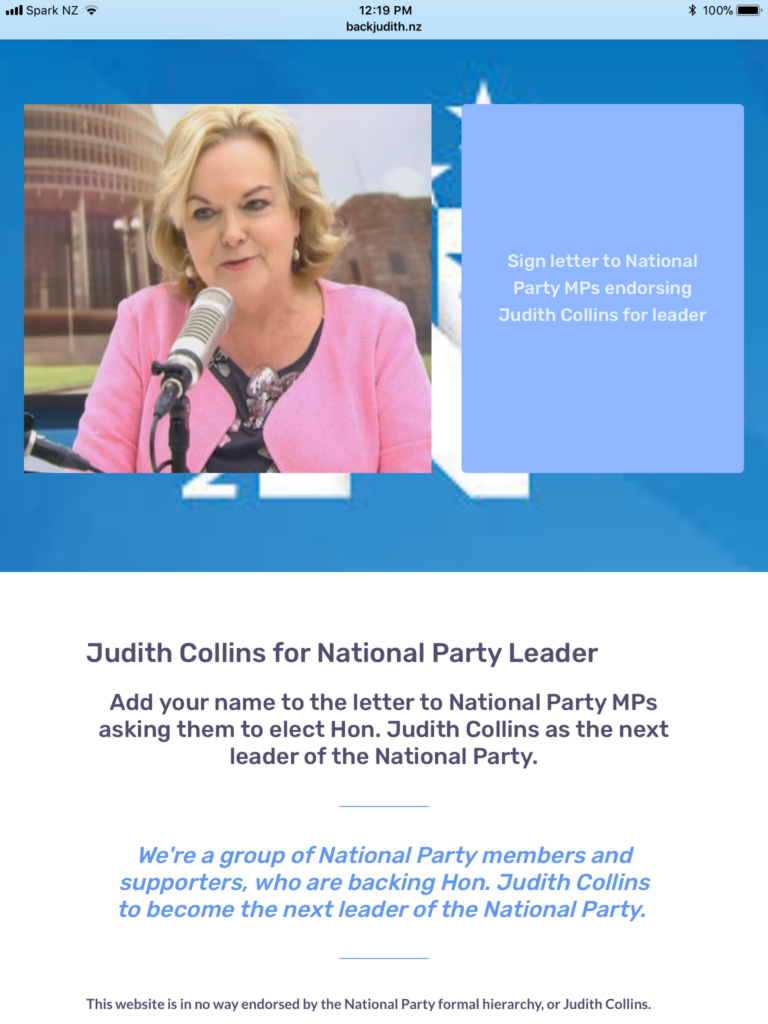
The site was not authorised or endorsed by the party in any way. Initial inquiries suggested that all the domain details were fake. Note that the domain was registered on Saturday 17 February.
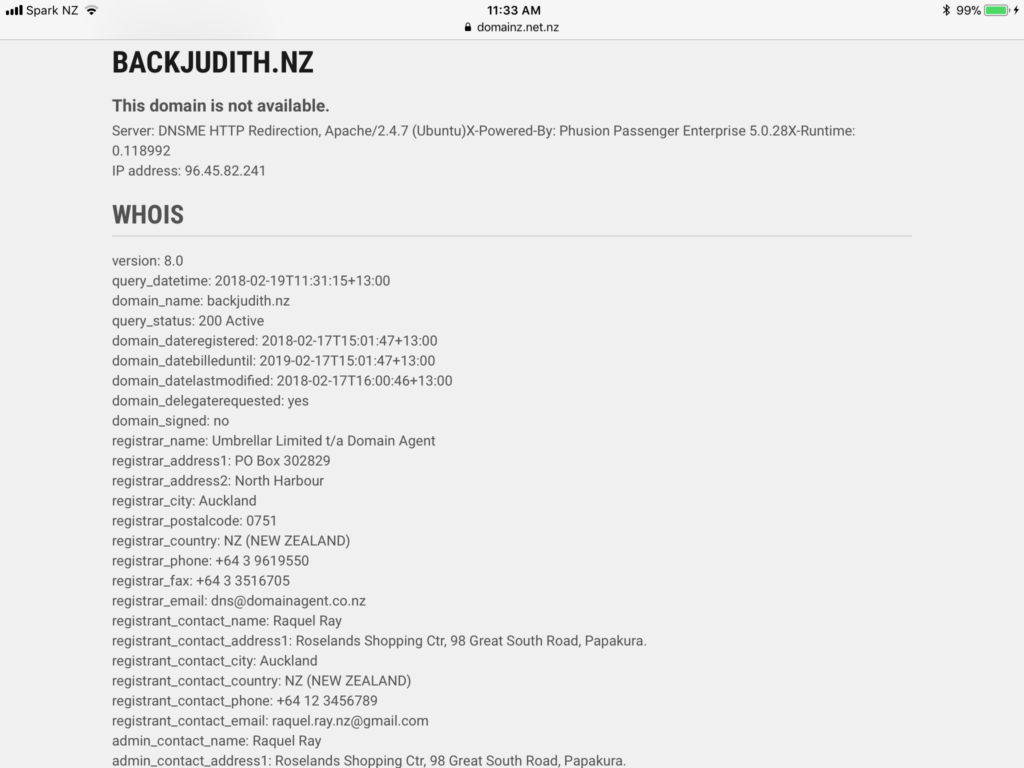
On the following Monday the site was launched and social media sites were swarming with rumours of the Taxpayers’ Union involvement as people had discovered a link to Jordan Williams’ personal email address.
Taxpayers’ Union director Jordan Williams’ personal email address was connected to an anonymous website backing Judith Collins for the National Party leadership, information provided to Stuff shows.
Williams said he was not behind the website on Monday and continues to deny it on Tuesday, instead suggesting that he is the victim of an elaborate smear.
The website appeared and was then deleted on Monday. It had a domain registered to a fake phone number and the name and email address of a “Raquel Ray.” This appears to be a fake identity.
The site was indeed taken down the same day, but questions remained about the use of the “Raquel Ray” persona. Williams told Stuff:
Williams said the Taxpayers’ Union had a “Raquel Ray” in its records as someone who had sent in tip-offs but ruled out any involvement from him or his staff.
“They’re in our database and have sent through a bunch of tips in the past,” Williams told Stuff on Monday.
“Otherwise we have absolutely no association and are not taking a position in this.
“It’s definitely not come from within.”
The problem with that explanation is that “Raquel Ray” only existed in one place on the internet: OIA requests made to Callaghan Innovation by the Taxpayers’ Union. “Raquel Ray” was one of a number of fake personas the Taxpayers’ Union admitted to using. In the example below you can see someone has mixed up two personas, “Raquel Ray” and “Robert Preston”
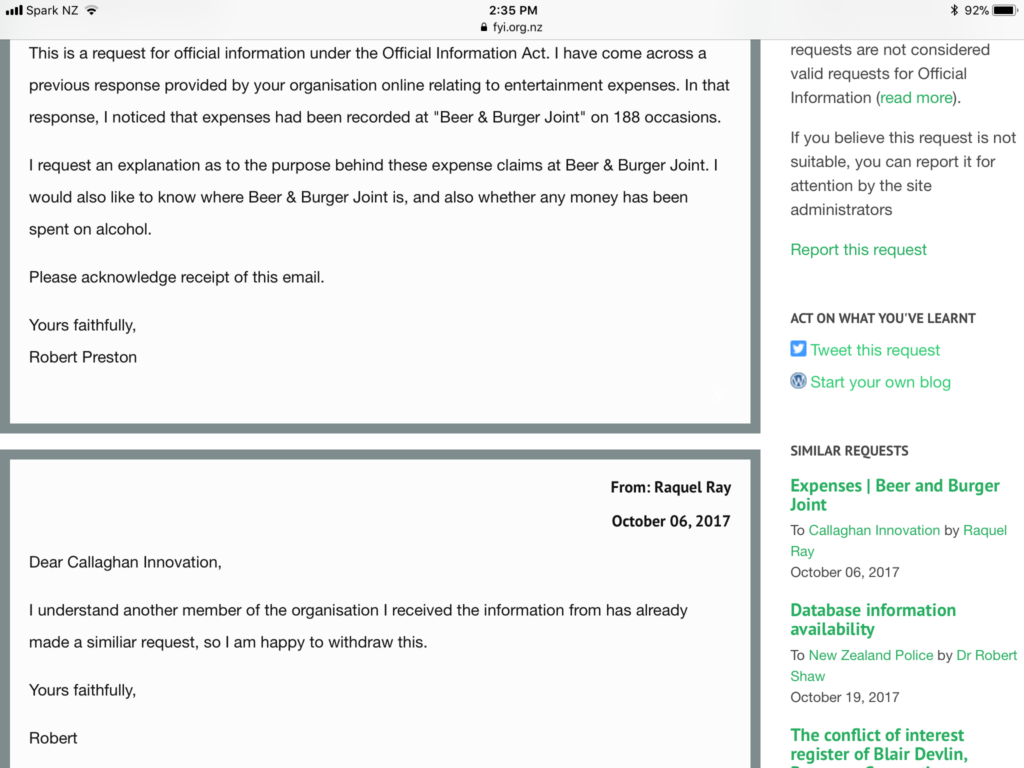
The link between “Raquel Ray” and Jordan Williams’ personal email address was explained as:
A screenshot provided to Stuff shows the Raquel Ray email address that was used to set-up the website has Williams’ personal email set as its password recovery email.
The last five letters of the email address are starred out but perfectly match Williams’ personal email address. He later confirmed he had received a message to that address concerning password recovery.
However, there is nothing to stop the person who controls the Raquel Ray account setting the account recovery address as Williams – there is no verification process.
This last point is correct, but it is interesting that immediately following publication of that story, whoever controlled the “Raquel Ray” gmail account changed the recovery email to one that better fitted the persona.
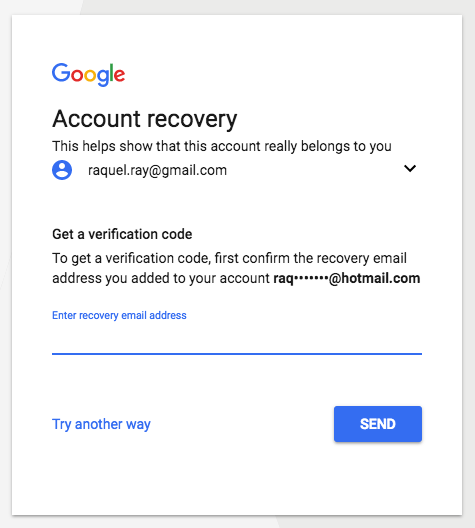
The other point worth noting is that while Williams claimed “his personal email address was available easily online and so it wouldn’t be that hard for someone to set him up in this manner.” that specific email address provided to Stuff yielded zero results on a Google search, suggesting it was improbable that someone could have used his email address in the way he suggests.
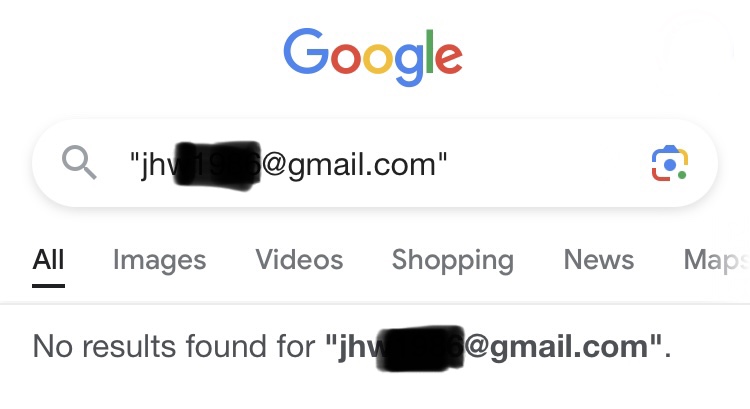
We’ll never know if the “Back Judith” web site debacle helped of hindered Judith Collins’ leadership aspirations, but we know how her story ultimately ended.
The Groundswell Campaign – grassroots or astroturf?
Jordan Williams incorporated The Campaign Company on 4 November 2021 and just ten days later the first inklings of its purpose appeared.
By November of 2021 the Groundswell farmer protest movement were preparing for their second major protest action, after their “Howl of a Protest” in July of that year. It’s promoters were promising “the mother of all protests.”
On 14 November 2021 the motherofallprotests.nz domain was registered, and within a few days people had started to notice the registrant was an organisation not previously associated with Groundswell: The Taxpayers’ Union.
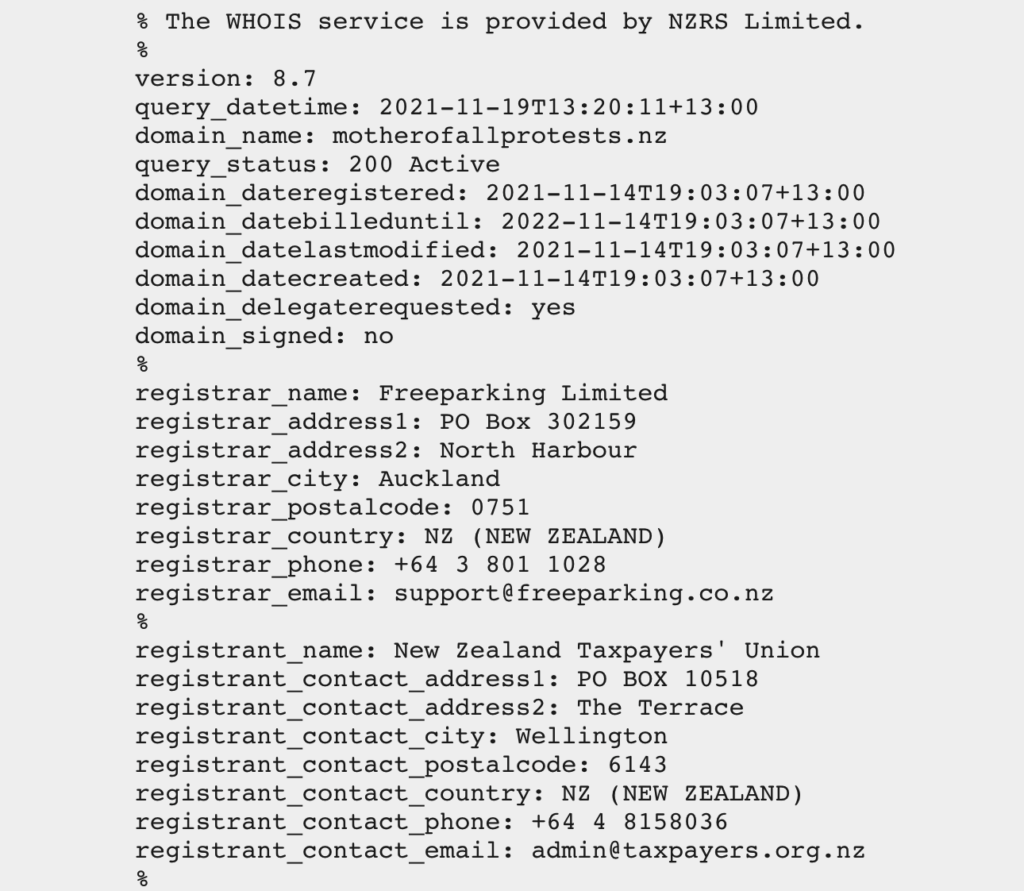
As questions started to be asked about the Taxpayers’ Union involvement in Groundswell, the domain details were quickly updated to those of The Campaign Company, a move that did little to quell speculation that Williams or the Taxpayers’ Union were somehow behind the formation of Groundswell.
As an aside, the domain’s registrant has since been changed to Groundswell, but seemingly having fulfilled its purpose, the motherofallprotests.nz domain is now languishing, awaiting deletion.
Adding further fuel to speculation that Williams or the Taxpayers’ Union were more involved in the Groundswell protest than they were admitting to was this email sent out to the Taxpayers’ Union mailing list on 19 November 2021, promoting the protest and making common cause with their anti-three waters agenda.
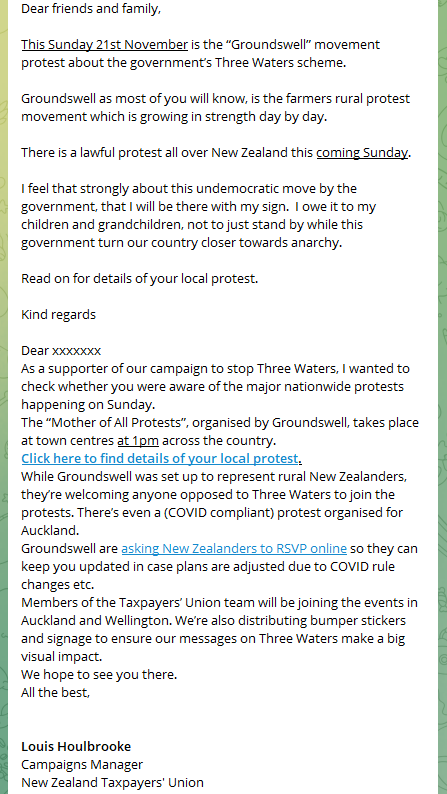
A few days later the founders of Groundswell, Bryce McKenzie and Laurie Paterson called in to online radio show The Country to set the record straight about their involvement with Jordan Williams and the Taxpayers’ Union: “We just happened to use the same tech guy that I think they [The TPU] use.”
Later in the interview they go on to explain that they were so impressed with work the Taxpayers’ Union were doing on their own Three Waters campaign they wanted something similar, “so we contacted them and said hey can you guys do a web site like that for us? And they said, no we can’t, but we can put you onto our contractor who does them for us.” That “contractor” of course was Jordan Williams of The Campaign Company.
As the months passed, the involvement of the Campaign Company with Groundswell became common knowledge, with Stuff describing the relationship as: “Groundswell may truly be a couple of farmers sick of meddling townies, but it did have the foresight to pay The Campaign Company – run by the Taxpayers’ Union’s Jordan Williams – to help design its digital campaign. This has given it on online presence that is hard for the more established players to ignore.”
And in stark contrast to the more furtive beginnings of the Campaign Company-Groundswell relationship, in July 2022 the Herald ran a sponsored advertorial paid for by The Campaign Company featuring a case study of their campaign with Groundswell.
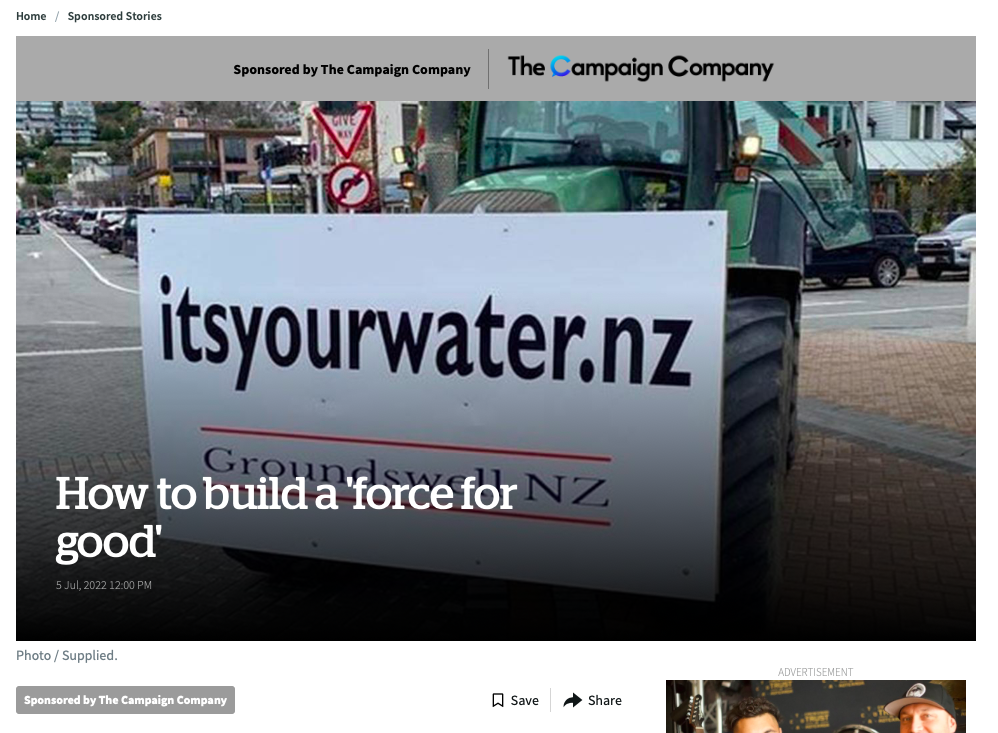
It was the first time The Campaign Company had sought publicity (albeit paid-for) but the quote below from Williams is instructive in comparing his ethos with that of the Atlas Network Academy – the training regime Atlas associates like Williams have access to (emphasis added).
“Groundswell’s leadership understands their sector better than anyone near Wellington,” says Williams. “Their leadership team in Gore picks the issues and prioritises their campaigns. But community building, fundraising, and the back-office requirements of a growing organisation, servicing and triaging tens of thousands of enquiries, is new territory for those leading this cause.”
“Groundswell has an advantage in being digital-first. They’ve already undertaken successful online submission campaigns on an emissions pricing alternative and on the Water Services Act regulations affecting rural water. Groundswell is bridging farmers directly to the decision makers in Wellington.”
(Hat tip to X user AnneleiseHall for spotting this)
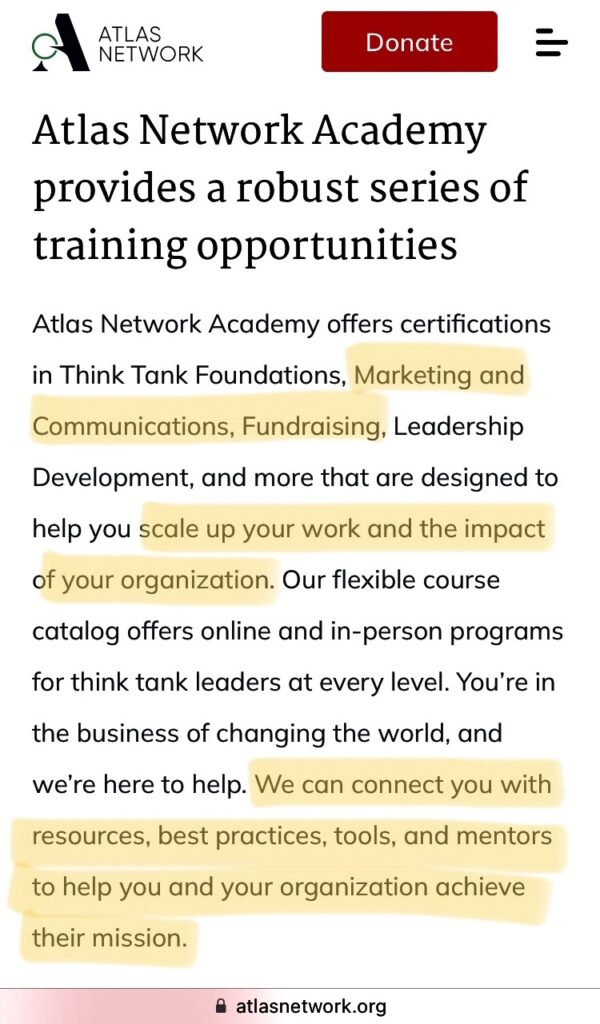
Just as the Taxpayers’ Union is a child of the Atlas Network (and a cookie-cutter copy of other international taxpayer groups), The Campaign Company can be viewed as the next iteration in the same model, as they enable another generation of astroturf groups to shape public opinion, for a fee, of course.
The Auckland mayoral campaign – a bob each way
Leo Molloy announced he was running for mayor in July 2021. A year later it was reported in July 2022 that The Campaign Company had been producing social media content for Leo Molloy’s mayoral campaign, but it is unclear for how long that relationship had been in place by then, or how much money The Campaign Company had received for their services.
Molloy announced he was pulling out of the race on 12 August 2022, just hours before candidate nominations officially closed. This meant he was not legally required to file a candidate return of donations and expenses relating to his campaign, so we may never know how much he spent with The Campaign Company.
Among the departure of a number of key campaign staff, Newsroom reported on The Campaign Company parting ways with Molloy’s campaign: “Jordan Williams, the CEO of The Campaign Company, told Newsroom, “I can’t go into the details, but we have respectfully parted ways. We are no longer engaged but we wish him the best.”
At the time of the Auckland mayoral campaign, while The Campaign Company was on Molloy’s payroll, another entity connected to Williams – Auckland Ratepayers’ Alliance – was bizarrely attacking Molloy on social media, and even placing a paid advertisement in the Herald. Williams had previously been the sole director and shareholder of Auckland Ratepayers’ Alliance, which was de-registered and folded into The Taxpayers’ Union in late 2021.
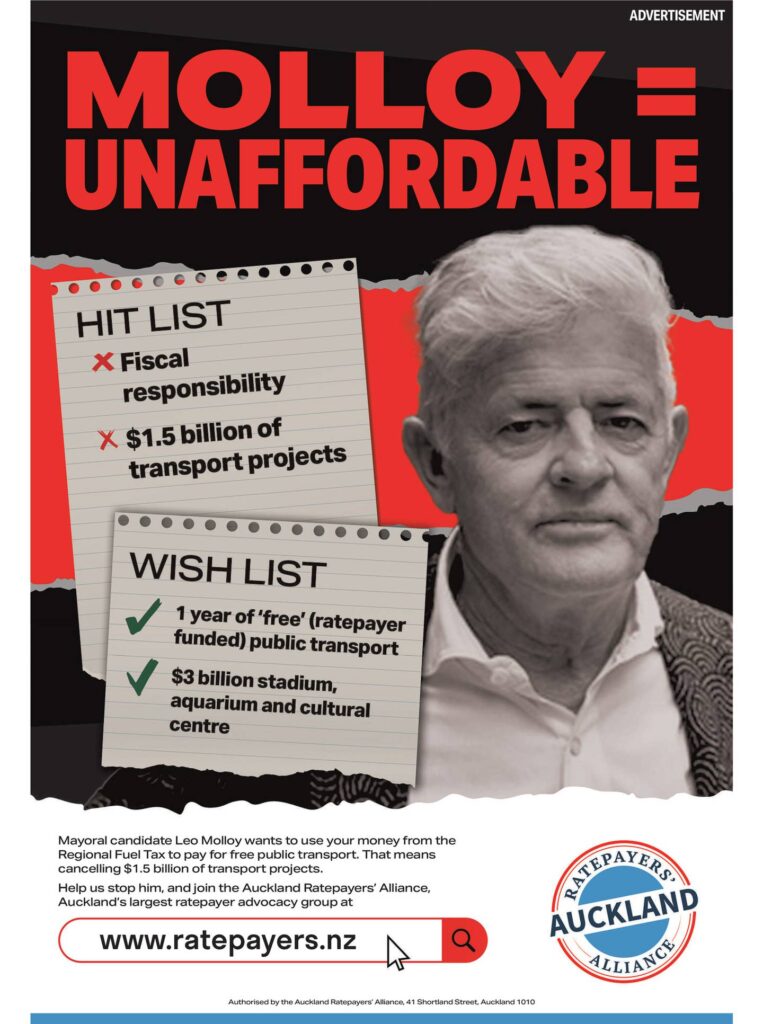
When asked about this apparent conflict by Stuff, Williams said “The Ratepayers’ Alliance rents a desk in my Auckland offices, but there is no co-ordination between them or any of the clients of The Campaign Company.”
It was later reported that The Campaign Company was working for competing mayoral candidate Viv Beck after an acrimonious split with her former digital agency. As early as 29 July 2022, the Campaign Company had created a Facebook page and registered new a new web domain for Beck’s campaign.
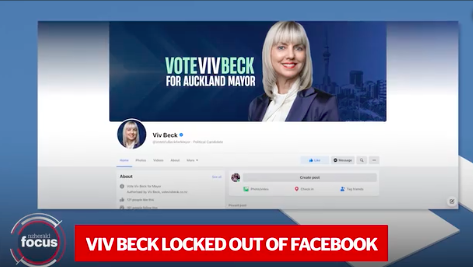
According to Beck’s return of electoral donations and expenses, she paid The Campaign Company $32,415 for “digital marketing and advertising”, distinct from the nearly $58,000 she spent with another agency for website and branding work.
A month after Molloy pulled out of the Auckland mayoralty, Beck also announced she was quitting the race, on the day voting opened. Of the two unsuccessful mayoral campaigns they had worked on, the only winner appeared to be The Campaign Company themselves.
Hobson’s Pledge – astroturfing against co-governance
In August 2023 RNZ reported that “a website aimed at immigrants, heavy on te reo and pushing a message of unity is accused of being deceitful and divisive.”

The ‘We Belong Aotearoa’ website and Facebook account was set up earlier this year.
With bright colours and a modern design, its stated purpose is “whiria te tāngata” – weave the people together.
Photographs of smiling people of various ethnicities are featured and the website says it stands for togetherness, unity, inclusiveness, and equality. It asks people to ‘join us’ by signing up with a name and email address.
The first version of the web site gave no clue as to who was behind it, but the domain was registered by The Campaign Company. The domain was originally registered in 2014 but was either parked or unused until May or June of 2023 when the new site launched.
In August, a note in dark type on a dark background was added to the website. The website was created by the lobby group Hobson’s Pledge, which is opposed to mandated Māori representation in central and local government. Don Brash, the former Act and National Party leader, was named.
When asked by RNZ why Hobson’s Pledge would create a site like this Brash told RNZ “the site exists to oppose co-governance, which is a legal concept of shared management for things like environmental resources.”
Dylan Reeve, author of Fake Believe: Conspiracy Theories in Aotearoa, said it was not unheard of for people trying to look like they are a grassroots group when they are not.
“I think it [We Belong] really looks like what we’d call astroturfing, for sure,” Reeve said.
The ‘We Belong’ website was a step more advanced.
The tactic was part of American political discourse, and was something he expected would continue in the future.
During the election campaign, people should be wary about who was behind any material on big political issues.
“If it seems quite cloaked, then I’d be deeply suspicious of who’s doing it, because I feel like legitimate organisations trying to raise concerns about political issues do so quite transparently,” Reeve said.
The webelong.co.nz domain is still registered, but no longer hosting any content. The Campaign Company is listed as the administrative contact for a number of other domains on behalf of Hobson’s Pledge (as well as hobsonspledge.co.nz itself) including isthisracist.nz, equalhealth.nz and bottomline.nz, all of which are still active at the time of writing, but hosting no content. They may have been secured for campaigns that were abandoned before the election, or we may yet see them in use in the future, weaponised for other astroturfing campaigns.
Astroturfing for big tobacco, because of course
In August 2023 RNZ reported on “The ‘corner dairy campaign’ quietly backed by big tobacco”
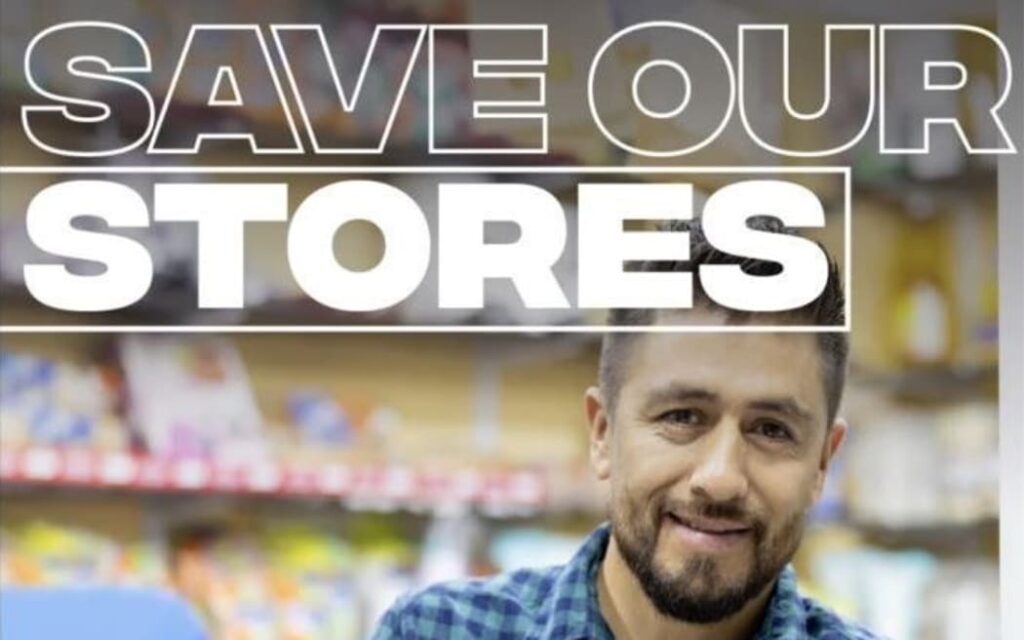
Since 1 August, ads have started showing up on Facebook urging people to support a petition to “save our stores”.
The ads, which lead to a website called Save Our Stores, ask users to sign a petition to repeal the Smokefree 2025 Act. The act includes a measure to reduce the number of stores selling full strength tobacco from 6000 nationwide to 600 by July 2024.
At first glance, the campaign appears to be an initiative from dairy owners. Under a headline of “who we are” on the website’s “about us” page, a dairy owner said to be from Lower Hutt is featured: “My name is Bhavesh. I’m a dairy owner in Lower Hutt. I’ve been serving customers for 17 years.”
However, smaller type at the bottom of the page says the website is “proudly supported” by tobacco companies BAT (British American Tobacco) New Zealand and Imperial Brands. The website’s privacy policy says the website is “provided” by the tobacco companies.
The domain saveourstores.nz was registered in June 2023 by The Campaign Company on behalf of Imperial Brands NZ and BAT NZ.
Astroturfing for profit – the numbers
Figures released by the Electoral Commission in February revealed close to $2 million was spent on the 2023 general election by “third-party promoters” – organisations that are not political parties but play a role in shaping voter opinions. This was more than ten times the amount declared in the 2020 general election.
Most of the record spend went on campaigners pushing for policies favoured by the centre right, and is 13 times more than was spent on the 2020 general election.
Figures released by the Electoral Commission show that of the 31 registered third-party promoters, seven spent more than $100,000 in the lead-up to voting. Only groups that spend more than $100,000 are required to share their expenses.
In previous elections, a maximum of three promoters reported spending more than $100,000. In 2020, five promoters also spent more than this on campaigning over the End of Life Choice Act referendum, but spending on promoting referendums is counted separately.
The Campaign Company is listed in the election expense returns for Groundswell, Hobson’s Pledge and the Taxpayers’ Union, though only third party promoters spending more than $100,000 in the election are required to file returns, so there may be other sources of income not in the public domain.
There are rich pickings to be had if you happen to be a digital campaign agency working with right-aligned groups looking to influence voters, and if the trend continues our next election could be positively flooded with dark money.
Groundswell spent $141,060 of which $78,200 went to The Campaign Company
Hobson’s Pledge spent $283,899 of which $34,500 went to The Campaign Company
The Taxpayers’ Union spent $371,565 of which $23,033 went to The Campaign Company
It’s worth remembering the figures above relate only to the regulated period around the 2023 general election. Much of The Campaign Company’s commercial work detailed in this piece will probably be worth considerably more.
While it could be argued that The Campaign Company is simply servicing a need for professionalised digital campaigning, their list of clients and projects would strongly suggest more than a passing alignment with the ethos of The Atlas Network that gave Williams and so many of his colleagues on the right of New Zealand politics their start in life.
Furthering the aims of the tobacco industry, undermining indigenous aspirations, sowing discord and undermining trust in public institutions that might hinder the aspirations of its billionaire backers are all common themes that run through Atlas-aligned organisations, and in this respect, The Campaign Company seems no different to the lineage of the rest of the Atlas Network family.

